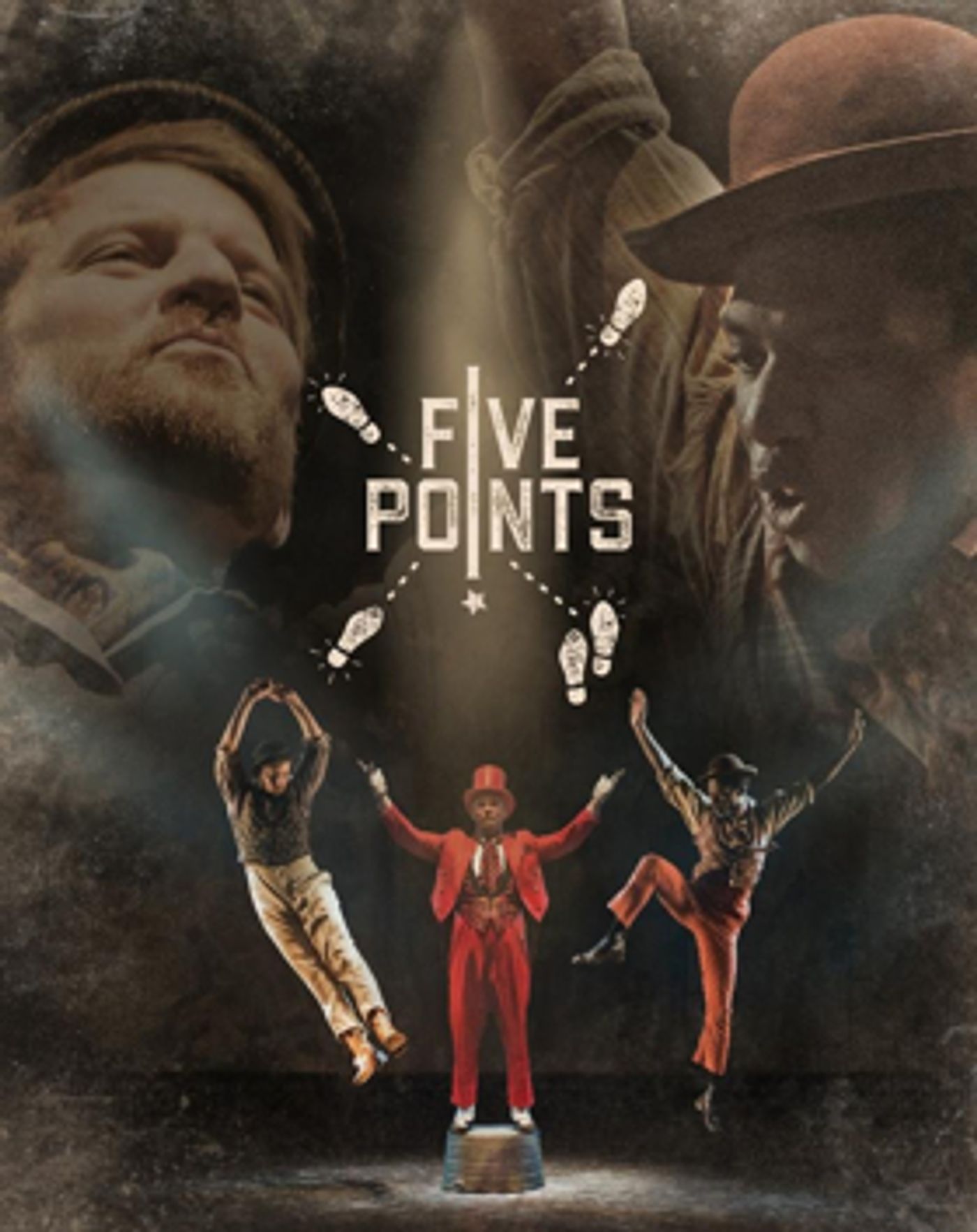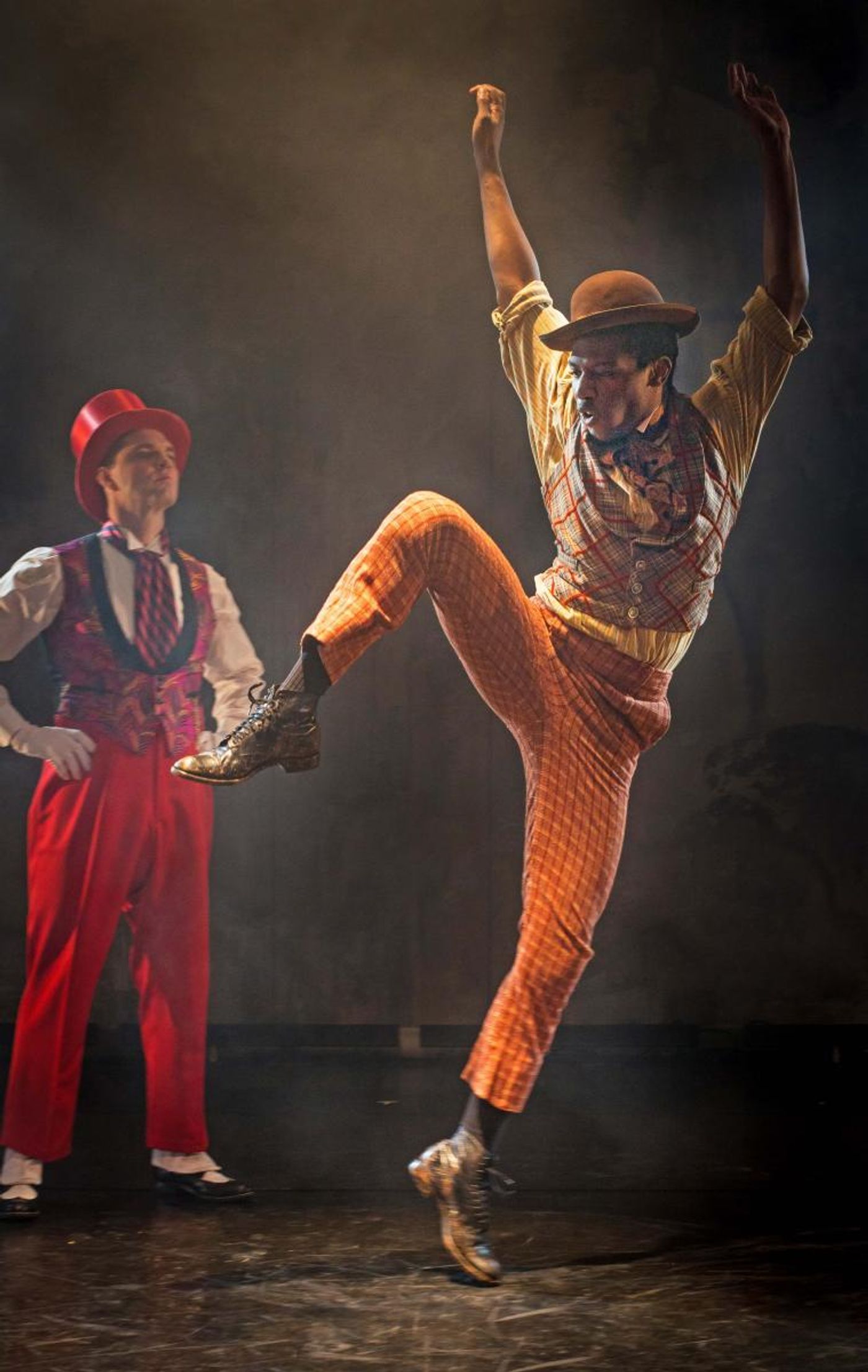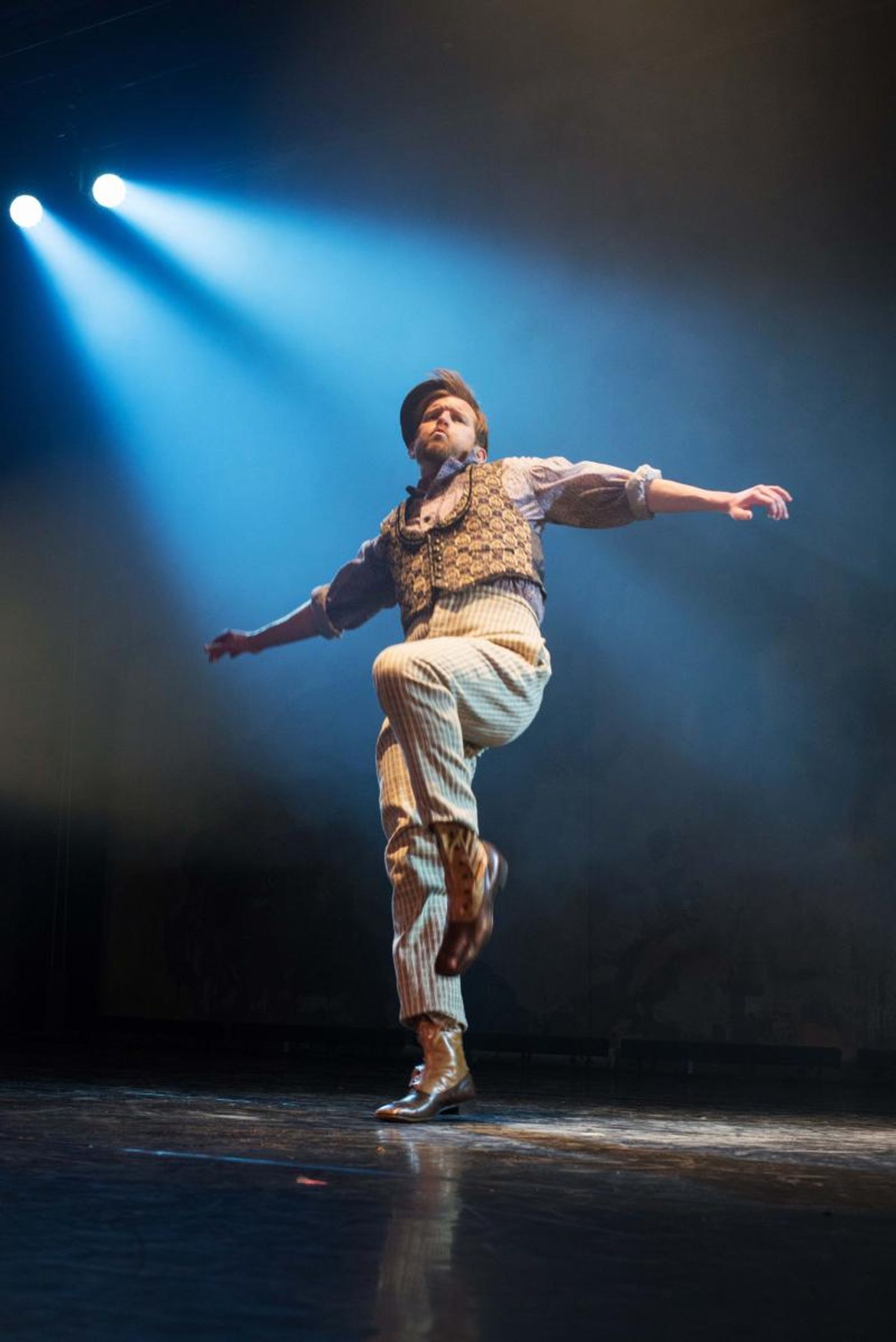Interview: 6 Questions & a Plug with FIVE POINTS stars Ben Bakken and Lamar Jefferson

Theater Latte Da is known for its quality and pushing musical theatre in new ways in the 20 years since its founding by Peter Rothstein and Denise Prosek. Its NEXT: 20/20 program is dedicated to developing and premiering 20 new musicals by 2020. That's a tall order for a local theatre company, but if any is to do it, it's this company.
The latest effort is the world premiere and fully staged production of FIVE POINTS. The score is the work of Douglas Lyons and Ethan D. Pakchar, a New York-based songwriting team with significant Broadway credits. The book is written by the prolific Twin Cities-based playwright Harrison David Rivers, who has penned three world premieres this season including FIVE POINTS, as well as productions at the History Theatre and Penumbra Theatre. Theater Latté Da Artistic Director Rothstein directs the production with Resident Music Director Prosek.
FIVE POINTS is set in 1863 in the Five Points: a crucible neighborhood on Manhattan's Lower East Side during the volatile years of the Civil War. The neighborhood is the new home of free African Americans and impoverished European immigrants. Inspired by the confluence of African American and Irish cultures, and the birth of American tap dance, FIVE POINTS tells the story of historical figures John Diamond and Master Juba, who risk everything for the chance to be a part of the American Dream.
Since this show is about dueling dancers, BWW is doing a duel interview for the first time in 6 Questions & a Plug -- with both leads, Ben Bakken and Lamar Jefferson, sharing their perspectives on the show, their characters and what it is like being part of an ambitious world premiere musical.
How did you get involved in FIVE POINTS? Were you involved in the workshopping or earlier iterations of the show?
Ben: I was not involved in any of the workshops or earlier iterations of the show. I had heard about these workshops from other local actors and how I might have been a good fit for it, but was never able to be involved or see it b/c of other commitments. When they were holding callbacks, I'm pretty sure it was the choreographer (and former teacher and good friend), Kelli Foster Warder, who suggested my name to the production staff, and they called me in. Local legends Tony Vierling and Michael Gruber (who was in a previous workshop) helped me out with recordings and basically convincing me I was a good fit and I should go in and audition...even though I had NO CLUE how to do an Irish Accent OR Irish dance. I had three callbacks. One for singing, one for dancing, and one for learning an Irish Accent with help from the most amazing and patient dialect coach Keely Wolter, recording it on video, and hopefully convincing the production staff I could pull it off. Whether I succeeded or not is still TO BE DETERMINED!
Lamar: I was not involved with any of the past workshops. My first encounter with the piece was auditions. The night of my audition I saw the NEXT series reading.
What was it like working on a brand-new musical and forming the lead characters for the first time?
Lamar: It was challenging and exciting all at once. This is my first time developing a new musical of this magnitude, so there were definitely times I thought I couldn't fulfill the demanding nature of this role. It's not like every other musical I've done where I can work on the music before I come into rehearsals, no, I had to learn on the spot. But, through all the laughter, tears, and iced ankles I'm beyond thankful. It has always been a dream to originate a role, and now I have.
Ben: It was stressful, challenging, and scary, but all in the best ways. You really want to give the writers what they envisioned when they created it and definitely feel that pressure even though all the creators were AMAZINGLY SUPPORTIVE. I put the pressure on myself and basically left every rehearsal (especially the dance ones!) feeling like I failed. However, my character had been well developed through all the workshops, so my character's arc didn't change much throughout the process. I tip my hat to Lamar, who has had to work much harder than me in rehearsals and performances due to script changes, new songs, his character's best friend dying and then coming back to life, choreography adjustments, etc.
Also, as a full-time theatre teacher/director at Hill-Murray School in Maplewood, I have the luxury to pick and choose shows that I want to audition for/be a part of (only if producers/directors want me in a show, of course). I try to pick shows that will stretch or challenge me as an artist, mostly so I grow and can in turn challenge my students. I truly love working as a teacher/director and consider working in professional theatres in town as continuing my education or "going back to school" as an artist. I get to learn from numerous brilliant artists in the Twin Cities and bring that knowledge back to school to pass on to my students.

The authors chose to create background stories for the characters you play, of which little was known. Did you dig into the known history of the actual men and learn more about their backgrounds before tackling this new work? (or of the era and area?)
Ben: I try to hold myself to the expectations I set for my students to avoid being a TOTAL hypocrite, so despite the lack of history of my character, I read the few books I could find about the Five Points, studied that Wikipedia page like crazy, watched GANGS OF NEW YORK, and was even fortunate enough to visit NYC a couple weeks before rehearsals started, touring the area formerly known as Five Points and visiting the Tenement Museum. However, I was chaperoning a group of 75 middle schoolers through those tours.....so I probably could have dived deeper if I wasn't busy making sure the students weren't getting lost in Chinatown and Little Italy.
Lamar: I did! Once I found out I was cast I looked into William Lane and P.T. Barnum and found a lot of interesting things. Sadly, there isn't a lot about Willie personally because they didn't care about the man, but the exhibit he came to be for the world. So, I found out a lot about where he danced and the reactions he received. The saddest info I found was that he died not too long after his fame from being worked to death. The most important thing for me was that Willie was the first African-American to be invited into white spaces and perform. This man is a hero and legend. Me and every other black performer are standing on his shoulders. That's what I find traction with, and what propels me through the story.
Since the show is billed as being about the birth of American tap dance, did you expect to be doing more of what people today know as tap, and even more dancing overall when you started this production? What did you think of how this story and the choreography came together to demonstrate the early pinnings of this art form?
Ben: After the dance callback, I figured I was out of the running due to lack of tap skills. When they offered me the role, I made it clear to Kelli that I was extremely nervous and lacked confidence that I'd be able to pull of anything close to resembling Irish dancing. Plus, I have a ton of Irish dance students in my theatre program at school and having seen them perform, I knew it was going to be a challenge. BUT - I wouldn't let my students say no to something I thought they were capable of only because they were scared to learn a new skill, so I had no choice but to accept the challenge. Basically, my history with (having had her as a dance teacher in high school) and trust in Kelli combined with her telling me I could do it, assured me I'd survive. Kelli made it clear at the beginning of the process that it wouldn't just be tap, as that was created out of this story. She had very distinct movements for John Diamond and Willie Lane, that when combined, you can see the origins of tap.
Lamar: I did think there would be more tap of what we think it to be today. But, that wasn't what Juba was doing at the time. People took what he did and built on top of his dance style. I was glad, because ya boy ain't a tapper. HA! I think the purpose of the musical is to show the two characters' struggles and barriers they have to go through to showcase their talent, not showcasing their talent itself.
Your characters' stories come together at the central dance battle but don't intersect much beyond that. How did you two work together, and with your director and cast mates, to find the symmetry of these men's stories?
Lamar: Table work is everything! We spent the first few days just exploring the text and finding our stories independently and how they mirrored each other. The cast has been nothing but uplifting and encouraging throughout this process for both of us.
Ben: I think all credit goes to the writers and creative staff. I focused on John Diamond and trusted in their storytelling. I don't speak for Lamar, but I am very thankful for our working relationship in just supporting each other in learning this challenging production. I didn't totally lose my mind because we were in the same rehearsal room, going through a similar experience (his was harder!), and we were supporting each other.

This being a new musical, what is your impression of the show's musical numbers overall, and what is your favorite number to perform and why?
Ben: Musical Theatre is my love and passion so the music sold me on this piece. It's just top-notch. The music being supported by Harrison's book and the design by the creative staff make this a show I'm very thankful to be a part of. It's definitely worthy of a life after this production, hopefully on Broadway. My favorite song is "Whistle in the Wind." It's an anthem sung by Lamar and John Jamison, and it's what the world needs right now. It's hopeful and inspiring. Also, listening to Alejandro Vega, sing "Will You," is the sweetest treat you'll ever hear. He's my idol. Seriously, that kid is amazing and in the future I'll be lucky to say "I knew him when" or "I played his father!" He is a true STAR Triple Threat.
Selfishly, I love singing my solo, "Without You." When performing, I love just letting go and putting all my heart and soul into a song. That song WRECKS me. I'm singing about my wife who died and I can't help but think about my actual wife (and fellow actor), Maureen Sherman-Mendez. It feels real to me. The music is what you look for in a musical, entertaining, impressive, but also incredibly heartfelt and touching. You'll feel all the feels when you listen to the cast recording in the future!
Lamar: The music is bomb! I find myself singing songs from the show all the time. I have two favorite numbers, the opening "Raise Your Glass" and Ben and my duet, "Hero." "Raise Your Glass" drops me into Willie instantly every night with all the dancing I do; and it's the only song that the entire cast gets to sing together, so the energy is CRAZY! And, let's be real, I love "Hero" because I get to sing with Ben Bakken. I'm welcome!
Time to plug your work! What is next on stage (or off) for each of you?
Lamar: Next up for me is WEST SIDE STORY at the Guthrie where I will be playing Action. Then, I will be playing Mr. Wimple and Christmas Future in A CHRISTMAS CAROL at the "G," also.
Ben: Excited to produce one of the, if not THE, first local amateur productions of Disney's NEWSIES at Hill-Murray School in November, but first I'll be playing with friends in MAMMA MIA! at the Ordway this summer!
More info and tickets:
Read a feature on the production by BWW Contributing Editor Karen Bovard here. BWW Contributing Editor Jill Schafer's review is here.
Visit http://www.latteda.org/five-points for details and tickets. FIVE POINTS runs until May 13, 2018. This is the show's extended run date. Tickets likely will sell fast so don't delay to reserve yours at this Northeast Minneapolis theatre gem, the Ritz Theatre.
Photos:
Ben Bakken (John Diamond), Dieter Bierbrauer (P.T. Barnum), Lamar Jefferson (Willie Lane), Photo credit Allen Weeks
Dieter Bierbrauer (P.T. Barnum) and Lamar Jefferson (Willie Lane),
photo credit Allen Weeks
Ben Bakken (John Diamond), photo credit Allen Weeks
Videos

